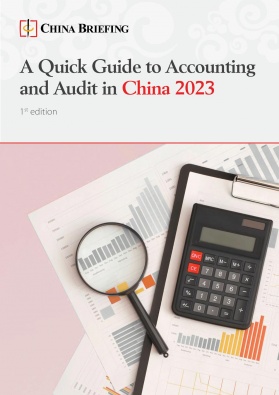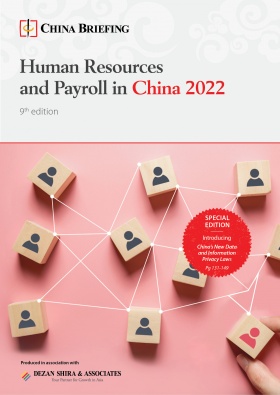How Will the Downgrade of COVID-19 to a Class B Infection Affect Companies’ Employee Management?
As China downgrades COVID-19 to a Class B infectious disease, companies will need to update their employee management protocols to cope with the new situation. Our professionals at Dezan Shira & Associates looked into some common issues that companies may come across in the coming weeks, including salary payment, sick leave management, contract renewal and termination, and so on. For more information or assistance, please contact Fuki Fu, Manager of Human Resources and Payroll Services at Dezan Shira & Associates Shanghai Branch.
On December 26, 2022, China’s National Health Commission (NHC), a cabinet-level executive department of the State Council that is responsible for formulating national health policies, announced that the official name for COVID-19, the “novel coronavirus pneumonia”, will be changed to the “novel coronavirus infection” (COVID-19 infections). The corresponding prevention and control measures for a Class B infectious disease will therefore be applied to COVID-19 infections, starting from January 8, 2023.
Previously, novel coronavirus pneumonia was classified as a Class B infectious disease, but was subject to the prevention and control measures of a Class A infectious disease, as stipulated in the Law of the People’s Republic of China on the Prevention and Treatment of Infectious Diseases.
The downgrade of COVID-19 management means that China has finally decided to remove some of its most stringent travel restrictions, a move that has been long-awaited by business groups. On the other hand, the policy shift will also affect businesses’ employee management practices, such as salary payment and sick leave management.
In this article, we look into some employee management issues that companies may come across after January 8, 2023.
1. How should companies pay employees who are infected with COVID-19 and cannot work?
Previously, people who had to undergo quarantine as a result of COVID-19 (either because they were infected, were a close contact, or lived in an area where positive cases had been discovered) could continue to get their normal salary during this period, in accordance with Article 41 of the Law on the Prevention and Treatment of Infectious Diseases. This article stipulates:
- “With respect to the places where there are cases of infectious diseases under Class A or to the persons in the special areas within such places, the local people’s governments at or above the county level where the above places are located may carry out isolation (quarantine) measures […]
- During the period of isolation […] if such persons have their own units, the units, which they belong to, shall not stop the payment of their wages.”
However, with COVID-19 being downgraded to Class B infectious disease management, people infected with COVID-19 will no longer be subject to quarantine, and the article above will no longer be applicable.
Instead, starting from January 8, 2023, if an employee is infected with COVID-19 and cannot work, the company should treat the employee’s absence as sick leave and pay the employee according to sick leave wage standards.
There are no national standards for sick leave wages and the regulations on the recuperation period are made at the local level. But in general, sick leave wages should be no less than 80 percent of the local minimum wage standard, in accordance with the Opinions on Several Issues concerning the Implementation of the Labor Law of the People’s Republic of China [Lao Bu Fa [1995] No. 309].
2. Do companies have to grant sick leave to all employees infected with COVID-19?
Not really. Three years after the first outbreak of the COVID-19 pandemic, the symptoms of COVID-19 infection have been much milder than before. People who have mild symptoms or no symptoms at all may not need to stop working and rest.
If infected employees need to rest or get medical treatment, they will have to go through the sick leave application procedures of the company, rather than obtain the sick leave treatment automatically.
However, amid the first wave of COVID-19 cases in China, companies are advised to keep their sick leave procedures a bit more flexible. As hospitals fill up with patients in more critical situations, asking all employees to provide proof of medical treatment to obtain sick leave will not be a very popular move, even if it is a requirement in the company rulebook. As long as employees can provide reasonable evidence (such as a picture of the employee with an antigen test result), companies are advised to grant sick leave to prevent unnecessary conflict and labor disputes.
3. Will employees infected with COVID-19 automatically be granted a medical treatment period (医疗期)?
Not really. As discussed above, symptoms of COVID-19 infections now vary greatly from person to person. Employees with minor symptoms or no symptoms can continue working or come back to work after a few days of sick leave.
A medical treatment period, which usually ranges from three months to 24 months based on the number of cumulative years the employee has worked, is a special type of sick leave in which the employer cannot terminate the employee suffering from non-occupational sickness or injury and is responsible for paying a proportion of salary by law.
If employees infected with COVID-19 want to get the benefits of a medical treatment period, they need to prove their symptoms are serious enough that they cannot work and have to get medical treatment. If the employee cannot provide a hospital diagnosis, the employer may confirm the employee’s situation in alternative ways, such as asking an employee to provide screenshots of online medical records.
4. Will COVID-19 infections be considered a “work-related injury”?
The Notice on Relevant Security Issues of Medical Care and Related Workers Infected with Novel Coronavirus Pneumonia as a Result of Their Job Duties (RSBH [2020] No. 11) stipulates that medical staff and other frontline staff who get infected with “COVID-19 pneumonia” while carrying out COVID-19 prevention and treatment duties should be considered as having gotten a work-related injury. Therefore, they would be entitled to certain legal benefits should they contract COVID-19. In particular, if a worker dies of COVID-19 pneumonia and their infection is recognized as a “work-related injury”, their family will be entitled to more compensation.
However, with the downgrade of COVID-19 management and the name change from “novel coronavirus pneumonia” to “novel coronavirus infection”, the legal basis for classifying COVID-19 infections for frontline staff as a work-related injury will no longer be applicable after January 8, 2023.
That is to say, COVID-19 infections will no longer be recognized as a “work-related injury”, except for death occurring within 48 hours of sudden illness during working hours and at work occasions, as stipulated in Article 15 of the Regulation of Work-Related Injury Insurance.
5. Should companies extend labor contracts for employees with COVID-19 infections?
Article 45 of the Labor Contract Law stipulates that if a labor contract expires under a set of specified circumstances, the labor contract shall be extended until the corresponding circumstances end. One of the specified circumstances is “illness or non-occupational injury within the prescribed repercussion period” as stipulated in Article 42 of the Labor Contract Law.
That is to say, companies should indeed extend labor contracts for employees with COVID-19 infections if their symptoms are serious enough that they have to stop working for medical treatment. For employees who are not qualified to enjoy the medical treatment period, the company is not obliged to extend their labor contract.
In this situation, the economic burden of companies will be alleviated a bit as they can save on certain social insurance costs and salary payments for terminating the expired labor contract in time.
6. Can companies terminate labor contracts with employees infected with COVID-19?
Previously, the Notice on Properly Handling Labor Relations Issues during the Prevention and Control of the Novel Coronavirus Pneumonia Epidemic issued by the Ministry of Human Resources and Social Security (MHRRS) made it clear that enterprises shall not terminate the labor contract of employees who are COVID-19 patients, suspected patients, or close contacts of confirmed cases, in accordance with Article 40 and Article 41 of the Labor Contract Law. That is to say, companies could not terminate such employees on the basis of a 30 days’ notice (Article 40) or mass layoff (Article 41).
Now, as long as employees are not entitled to a medical treatment period treatment introduced in previous sections, they are no longer entitled to any special protection. That is to say, companies can terminate relevant employees based on all legal grounds, including Article 40 and Article 41 of the Labor Contract Law.
7. Can companies ask employees with COVID-19 infections to not come to the workplace?
As COVID-19 infections will no longer be subject to the prevention and control measures of a Class A infectious disease and no longer be included in the administration of quarantinable infectious diseases as stipulated in the Border Health and Quarantine Law of the People’s Republic of China from January 8 onward, employees who are infected with COVID-19 but would like to work normally cannot be prevented from going work by the company, but the company can arrange for these employees to work from home upon their mutual agreement.
Returning to normality
China is endeavoring to shift to “living with COVID” and return to normal. Companies should therefore also adjust their business activities and employee management practices accordingly.
Many companies have developed special employee management procedures over the past three years to deal with the COVID-19 prevention and control requirements. With the downgrade of COVID-19 management to a class B infectious disease, such special employee management procedures may no longer be applicable.
Companies should therefore adjust their employee management rules and procedures to cope with China’s new COVID-19 playbook.
To do this, companies are especially advised to:
- Review their current rules and procedures with the help of professionals to ensure they are not violating any regulations;
- Standardize their sick leave policy, such as specifying the conditions for sick leave, the required materials for proof of illness, and the leave application process;
- Standardize measures for tackling violations of company rules, such as absenteeism;
- Improve the processes for formulating company rules and regulations.
Note: This article is based on the laws and regulations at the time of writing. As the regulatory environment is changing frequently, we will continue to monitor for updates on issues introduced in the article. For professional advice or assistance with employee management, please contact us at China@dezshira.com.
About Us
China Briefing is written and produced by Dezan Shira & Associates. The practice assists foreign investors into China and has done so since 1992 through offices in Beijing, Tianjin, Dalian, Qingdao, Shanghai, Hangzhou, Ningbo, Suzhou, Guangzhou, Dongguan, Zhongshan, Shenzhen, and Hong Kong. Please contact the firm for assistance in China at china@dezshira.com.
Dezan Shira & Associates has offices in Vietnam, Indonesia, Singapore, United States, Germany, Italy, India, and Russia, in addition to our trade research facilities along the Belt & Road Initiative. We also have partner firms assisting foreign investors in The Philippines, Malaysia, Thailand, Bangladesh.
- Previous Article China–Turkmenistan: Bilateral trade, Investment, and Future Prospects
- Next Article China Cancels Foreign Trade Operator Registration, Simplifying Import and Export Procedures







